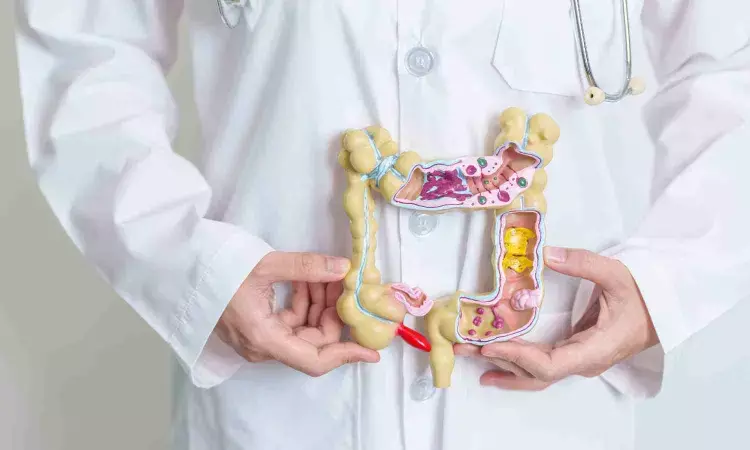- Home
- Medical news & Guidelines
- Anesthesiology
- Cardiology and CTVS
- Critical Care
- Dentistry
- Dermatology
- Diabetes and Endocrinology
- ENT
- Gastroenterology
- Medicine
- Nephrology
- Neurology
- Obstretics-Gynaecology
- Oncology
- Ophthalmology
- Orthopaedics
- Pediatrics-Neonatology
- Psychiatry
- Pulmonology
- Radiology
- Surgery
- Urology
- Laboratory Medicine
- Diet
- Nursing
- Paramedical
- Physiotherapy
- Health news
- Fact Check
- Bone Health Fact Check
- Brain Health Fact Check
- Cancer Related Fact Check
- Child Care Fact Check
- Dental and oral health fact check
- Diabetes and metabolic health fact check
- Diet and Nutrition Fact Check
- Eye and ENT Care Fact Check
- Fitness fact check
- Gut health fact check
- Heart health fact check
- Kidney health fact check
- Medical education fact check
- Men's health fact check
- Respiratory fact check
- Skin and hair care fact check
- Vaccine and Immunization fact check
- Women's health fact check
- AYUSH
- State News
- Andaman and Nicobar Islands
- Andhra Pradesh
- Arunachal Pradesh
- Assam
- Bihar
- Chandigarh
- Chattisgarh
- Dadra and Nagar Haveli
- Daman and Diu
- Delhi
- Goa
- Gujarat
- Haryana
- Himachal Pradesh
- Jammu & Kashmir
- Jharkhand
- Karnataka
- Kerala
- Ladakh
- Lakshadweep
- Madhya Pradesh
- Maharashtra
- Manipur
- Meghalaya
- Mizoram
- Nagaland
- Odisha
- Puducherry
- Punjab
- Rajasthan
- Sikkim
- Tamil Nadu
- Telangana
- Tripura
- Uttar Pradesh
- Uttrakhand
- West Bengal
- Medical Education
- Industry
Intraoperative low-dose ketamine and dexmedetomidine fail to improve bowel recovery after complex GI malignancy surgeries: Study

The patients were divided into three groups: ketamine (KET), dexmedetomidine (DEX), and placebo, and the primary outcome was the time to first flatus and/or stool. The secondary outcomes included time to extubation, total analgesic requirement, postoperative pain scores, time to feeds, duration of intensive care unit (ICU) and hospital stay, and the incidence of adverse events.
Study Results
The results showed that there was no significant difference in the median time to passage of flatus and/or stool between the KET, DEX, and placebo groups. However, pain scores and analgesic consumption were significantly lower in the intervention groups (KET and DEX) compared to the placebo group. Other secondary outcomes did not show significant differences between the groups. The study concluded that low-dose ketamine or dexmedetomidine did not result in early bowel recovery despite lower pain scores and opioid consumption in patients undergoing open GI malignancy surgeries.
Research Methodology
The paper discussed the rationale for studying the effects of ketamine and dexmedetomidine, emphasizing their potential for promoting bowel recovery due to their opioid-sparing and anti-inflammatory properties. The study was conducted after obtaining ethical approval, and informed written consent was obtained from each patient. Patients were randomized into different groups, and the drugs for infusions were administered by personnel not involved in the study to ensure allocation concealment. Various factors such as duration of surgery, intraoperative fluid requirement, and adverse events were monitored and recorded, and the results were analyzed using statistical methods.
Conclusion
In conclusion, the study found that intraoperative infusion of low-dose ketamine or dexmedetomidine did not result in faster bowel recovery compared to placebo, despite lower postoperative pain scores and analgesic requirements. The findings provide valuable insights into the efficacy of these drugs for promoting bowel recovery in patients undergoing GI malignancy surgeries.
Key Points
- The study compared the effects of intraoperative low-dose ketamine and dexmedetomidine infusion on postoperative bowel recovery in patients undergoing gastrointestinal (GI) malignancy surgeries. - 84 patients were divided into three groups: ketamine (KET), dexmedetomidine (DEX), and placebo. The primary outcome was the time to first flatus and/or stool, and secondary outcomes included time to extubation, total analgesic requirement, postoperative pain scores, time to feeds, duration of intensive care unit (ICU) and hospital stay, and the incidence of adverse events.
- The results showed no significant difference in the median time to passage of flatus and/or stool between the groups, but pain scores and analgesic consumption were significantly lower in the KET and DEX groups compared to the placebo group.
- The research methodology included obtaining ethical approval and informed consent, randomizing patients into different groups, administering drugs by personnel not involved in the study, monitoring various factors, and analyzing the results using statistical methods.
- Limitations of the study included the inclusion of patients undergoing both gastric and colorectal cancers, potential variation in drug doses, and the potential influence of epidural analgesia on bowel recovery.
- In conclusion, the study found that low-dose ketamine or dexmedetomidine did not result in faster bowel recovery compared to placebo, despite lower postoperative pain scores and analgesic requirements, providing insights into the efficacy of these drugs for promoting bowel recovery in patients undergoing GI malignancy surgeries.
Reference –
Kumar SK, Misra S, Behera BK, Singh N, Muduly DK, Srinivasan A. The effect of intraoperative low‑dose ketamine versus dexmedetomidine infusion on postoperative bowel recovery in patients undergoing gastrointestinal malignancy surgeries: Placebo‑controlled, randomized trial. J Anaesthesiol Clin Pharmacol 2024. DOI: 10.4103/joacp.joacp_322_23
MBBS, MD (Anaesthesiology), FNB (Cardiac Anaesthesiology)
Dr Monish Raut is a practicing Cardiac Anesthesiologist. He completed his MBBS at Government Medical College, Nagpur, and pursued his MD in Anesthesiology at BJ Medical College, Pune. Further specializing in Cardiac Anesthesiology, Dr Raut earned his FNB in Cardiac Anesthesiology from Sir Ganga Ram Hospital, Delhi.
Dr Kamal Kant Kohli-MBBS, DTCD- a chest specialist with more than 30 years of practice and a flair for writing clinical articles, Dr Kamal Kant Kohli joined Medical Dialogues as a Chief Editor of Medical News. Besides writing articles, as an editor, he proofreads and verifies all the medical content published on Medical Dialogues including those coming from journals, studies,medical conferences,guidelines etc. Email: drkohli@medicaldialogues.in. Contact no. 011-43720751


